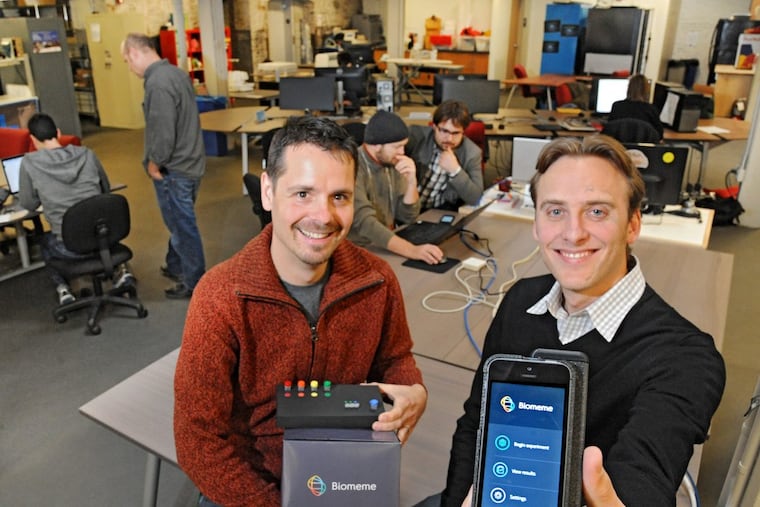NextFab draws makers from Boston, NYC to Philly
Its venture program and investment committee have picked five start-up winners for this fall's enlarged September-to-November "RAPID Hardware Accelerator" program class. Prizes include $25,000 in seed funding and access to NextFab machines.

Eight years ago, Evan Malone hit Philadelphia with his new Ph.D. from Cornell and plans for the for-profit NextFab chain of industrial- and brain-powered maker-spaces, which today include a factory-sized center on Washington Avenue in South Philly plus satellites in Old City and Wilmington. Now, his plot to "poach start-ups from Boston, New York" and bring them to Philly from other brainy but higher-cost-basis cities is gaining speed.
From 37 detailed business-plan applicants — product, team, marketing, and funding strategies from as far as France, Brazil, and India — NextFab's venture program and its investment committee have picked five start-up winners for this fall's enlarged September-to-November "RAPID Hardware Accelerator" program class. Prizes include $25,000 in seed funding and access to NextFab machines. The chosen are:
Unruly Studios, a Boston-based education-technology company offering "active STEM play experience for kids ages 6-12 to get them moving around and learning to code."
POWTI Innovations, northern Virginia-based "creators of a fully automated, stand-alone traumatic injury detection device" that calls for medical help. Cofounders include Thomas Cavett, a Wharton MBA student and former U.S. Army Green Beret and medic.
Kelby, a New York-based firm whose "fully-automated, aeroponic, app-controlled" planting cubes, for plant study and growth, aim "to revolutionize farming, allowing anyone to grow anything anywhere."
Robocandy, a Philadelphia firm that designs "premium, compact and modular arcade cabinets for eSports tournaments and retro gaming enthusiasts." The company's founder & CEO is Langston Clement.
EAOS, motorcycle riders Alperan Topay and Emin Faki's Drexel-founded firm that's building "audio and communication systems for adventurous lifestyles" into helmets.
NextFab is tired of seeing Philadelphia export bright entrepreneurs to "New York and San Francisco, to take advantage of more established start-up ecosystems," CFO Ken Tomlinson said in a statement. "[RAPID] is reversing this trend and drawing great hardware start-ups from other areas to Philadelphia." The program started last year, mostly with Philadelphia-area applicants, but word spread fast: "There is strong demand for the tailored mixture of funding, product development, and business development services that we offer."
RAPID stands for "Revenue through Advanced manufacturing, Product development, Innovation, and Design."
"Our goal is to help them utilize some excellent local manufacturing resources and show them that staying in the region, growing their operations here, and hiring talent in Philadelphia makes economic sense," added Todor Raykov, NextFab's venture services manager.
In an early-morning email, Malone claimed for NextFab a key role in a Philly-based digitally enabled hardware start-up "ecosystem" that also includes the pioneering, state- and bank-funded Benjamin Franklin Technology Partners investment program, Bucks County electronics maker IMET Corp., and Marvin Weinberger's Makers Meetup, the hardware how-to group that gathers would-be industrialists with the people who make 3-D printers and other advanced machine tools for the digital-controls and sheets-of-molecules generation.
Among recent hardware companies that got their start with NextFab and its partners, Malone counts Noria, Biomeme, ConnectDER, TowerView Health, and BioBots, among others.